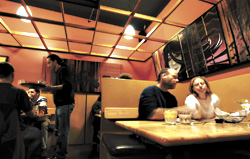“Oh yeah, we forgot to mention . . . it’s going to be loud,” Helio Sequence vocalist/guitarist Brandon Summers murmurs amiably to the crowd at Music Millennium. The Portland independent record store is packed for this in-store performance. The aisles, lined with rows of plastic placards showcasing thousands of different band names and their countless CDs, are crammed with fans from the ages of 5 to 65. The windows are clouded with steam from the breathing bodies, drips of condensation streaking the glass.
Everyone is here to listen to the almost-hometown boys (Beaverton, Ore., just over the hill, is where the two Helio Sequence members were born and raised) perform tracks from their most recent full-length, Keep Your Eyes Ahead, the follow-up to 2004’s Love and Distance. And they are, indeed, quite loud. As the rough, splintered wood floors vibrate and the Plexiglas barrier in front of the band rattles, it’s hard to believe it’s only two people making all that noise. Summers’ vocals, solid and strong, bear no sign of the fact that, for a long stretch during the four years since their previous record, his primary instrument, his voice, had stopped cooperating entirely.
“It was somewhere in Europe,” recalls drummer Benjamin Weikel, the other half of the Helio Sequence. We’re in a cavernous booth at downtown Portland’s über-hip Ace Hotel the next day, where the adjacent wall, intentionally scrawled with Leonard Cohen lyrics, is part of the design scheme.
“We had gone from L.A. all the way across the States to N.Y. and then to Europe and back,” adds Summers of when his voice began to fail. “It was really strange times; the record [Love and Distance] had just come out, and I spent two years away from my wife, and it was getting to the end of that, which was really difficult.”
Summers and Weikel often talk over and along with each other. They complete sentences and add supplementary responses, in the manner of two friends who know each other’s stories better than their own. It’s a necessary symbiosis: From the beginning, the band has largely consisted of just the two of them.
Since becoming friends in the early ’90s, they’ve rarely been apart. Summers was originally friends with Weikel’s younger brother, and the three of them would have sleepovers, trade records, and watch videos of bands like Aphex Twin and Sonic Youth on Bohemia Afterdark. Summers and Weikel both worked at the über-unhip Beaverton Music, a store in their hometown that sells sheet music and leases instruments to school bands. “We convinced them to carry guitars and stuff,” chuckles Summers, who goes back each year to help demonstrate the instruments to elementary-school kids. They worked there for nearly a decade, even using the store to record their first two full-lengths, Com Plex and Young Effectuals, after getting signed by Portland indie Cavity Search Records following their first NXNW showcase in 1999.
“We were sleeping three or four hours a night at the store, and recording and working at the store. We’d sleep on the floor, wake up, flip the sign, and go get some coffee and start working,” Summers recalls.
For 2004’s Love and Distance, however, they were left without a place to record, since they’d quit their jobs at Beaverton Music and relocated to Portland. The duo moved around, recording everywhere and anywhere they could, including the home studio that Isaac Brock (who at the time enlisted Weikel to drum for Modest Mouse during Jeremiah Green’s absence) had on a piece of property outside the city. The constant upheaval made for a somewhat disjointed yet spit-shined album. It earned them solid marks in the electro-indie-pop category and catapulted them onto the road for months of touring with the likes of Blonde Redhead and Kings of Leon. That was when Summers’ voice began to give way.
Fearing he had developed nodes on his vocal chords (which would mean his voice would be permanently damaged), he returned home from tour to find that, luckily, it was just extremely strained. He was ordered to quit speaking for at least two months, and began an intense recovery process that included everything from refraining from liquor and mint tea to taking a more stripped down, back-to-basics approach to his music.
“There was this day that I went out record shopping and I didn’t know what I was doing with myself, and I picked up a copy of The Times They Are A-Changin’. I brought it home, and was like, ‘I’ve heard Dylan before. It’s just another Dylan record.’ But I just remember sitting there listening to that record, and just being blown away. It was timing. It hit me right, and it hit me deep.”
Summers’ focus on finding and strengthening his voice again often meant hours spent alone with an acoustic guitar. Naturally, folk inspirations loomed large, from Dylan to Portland old-time group the Foghorn Stringband. Listening to the Helio Sequence’s back catalog—which is rife with rich sonic layering, blips, beeps, synths, and full-bodied drum fills—the influence of My Bloody Valentine looms larger than that of any folk legend. But Keep Your Eyes Ahead, while still retaining much of the same Helio Sequence flavor, is punctuated with tracks that sound as though they could have been penned at the Chelsea Hotel in the late ’60s.
Midway through the album, the stark, acoustic finger-picking of “Shed Your Love” draws listeners in. Summers’ vocals, sounding stronger than ever, are showcased boldly in the mix with minimalist background atmospherics. “Drank the dark wine of the New York night/A shattered mind across the borderline/Spent the night in someone else’s arms/Shed your love/Shed your love,” he sings in a gentle, husky, nasal twang that more than hints at his newfound admiration for Dylan.
Intimate gems like this one are packed tightly amidst Helio Sequence doing what they do best, the majority of the record heavy with driving, dense rockers like “Lately” and the title track, in which Weikel’s percussion and orchestration talents dominate. What sets the record apart from their previous albums, however, is the balance between the harder songs and the quieter, stripped-down moments like “Shed Your Love.” “Broken Afternoon,” a sparse, ominous, and introspective track laced with a hopeful silver lining, and “No Regrets,” an uplifting hymnal folk jam replete with hand claps, foot stomps, yelps, and wheezing harmonica, bring the record to a close.
“You listen to the first song and the last song…there’s somebody that lost something there. But at the end, [it feels like] there’s some sort of understanding or revelation,” says Weikel.
“There is a lot of loss [on the album],” Summers agrees. “But I don’t believe that something can be lost forever.”






